- Home
- Johnny D. Boggs
Return to Red River Page 2
Return to Red River Read online
Page 2
Then came the winter of 1880–81, a harsh one, not in Texas, but way north on the High Plains. Cattle drifted in the wind, kept drifting, and come spring, “floaters”—crews of cowboys from ranches as far north as Wyoming—drifted into South Texas. They came to gather their beeves and herd them back to the range, hundreds and hundreds of miles to the north. Which they did, after a long while. After they left, the Texas ranges had been pretty much picked clean.
When the Southwestern Texas Livestock Association held a membership meeting after the spring gather—or what passed as a roundup that year—Mathew had spoken out against stringing up wire. But the T Anchor had already enclosed more than two hundred thousand acres. Old Charlie Goodnight announced that he would fence in his ranches. Mathew held out, and he stopped a few other ranchers from putting up those fences. The Garth name carried a lot of weight in Texas, much as had the name of Thomas Dunson, Matt’s surrogate father, decades before.
A year later, ranches up in the Panhandle began putting up fences to keep cattle from drifting down and eating grass meant for Texas longhorns. After the winter of 1884–85, those fences stopped plenty of cattle from Kansas, Nebraska, and the Indian Territory. And when the ranchers met that summer in San Antonio, Mathew relented.
He brought in freighters. They came with tons of barbed wire. Quite a few of Mathew’s hired hands balked at stringing up fences, which Mathew understood and even appreciated. Cowboys were, well, kind of uppity. They’d do practically anything—as long as they were horseback. But put a hammer and wire stretcher in their hands, or—even worse—a post-hole digger, and they’d moan and curse, or up and quit. More than a few had drawn their time and tried to find someplace in the West where you couldn’t find barbed wire.
Those places, Mathew had learned, kept growing scarcer.
Back in January, Mathew and his wife, Tess Millay, had been in Galveston when the first blizzard struck. Eleven degrees on the Gulf of Mexico that night. Matt and Tess had stepped out of their hotel the following morning—had to go to a mercantile to buy winter duds—and stared in amazement at the beautiful bay . . . covered with a layer of ice. By the time they had left, the bay was frozen three or four inches deep, and six inches of snow covered the city’s streets.
* * *
He kept riding, deciding that Debil had a better sense of direction than he did. All this snow made it hard to find landmarks he had been relying on since Dunson had claimed this land as his own. Mathew could have simply followed the trail the gelding had made when they had left the ranch headquarters that afternoon, but his range covered a lot of sections, and he wanted to see more, no matter how bad he would find everything.
And Mathew Garth knew things were bad. There weren’t that many drift fences this far south, and he had to figure that the Panhandle and North Texas ranges had fared a whole lot worse than down here. The dead cattle here had eluded drift fences far to the north. No telling how many cattle had died on the West’s vast ranches.
Thousands, he figured. The blizzard, the fences, would take a hefty toll on ranches across Texas, across the entire West.
He had seen enough.
Carcasses filled streambeds where longhorns, Herefords, and other breeds had crashed through the ice. Others had walked off bluffs, crashing to their deaths. Some had been mired in bogs, or ditches, to starve and freeze, or, if lucky, be trampled by the hundreds of cattle drifting with them.
Reining in Debil, Mathew found something he had missed on the ride to the death fence. The ice and snow in an arroyo had been dyed crimson, and as he dismounted and moved toward the carnage, he let out another harsh, wintry sigh. Two cows and a calf had been caught in a quagmire, it appeared, only none had been fortunate. He read the signs quickly, shook his head, mounted the skittish gelding, and rode on.
Wolves had always been pests down here. Those Mexican lobos had feasted on the longhorns, and Mathew’s cowhands most likely had branded those cattle—although he would never know for sure, not after the job those gray brutes had done.
He had to think, however, that he had fared better than most. Most of his cattle, though certainly not all, grazed south of the drift fence. They would have drifted, of course—that’s what longhorns do—but they would find shelter in the arroyos and draws and thickets all the way until they reached the Rio Grande.
A mile or two later, he reined in the dun. Ahead of him and off to his left stood the Mexican wolves. Six, by his count, snarling, watching, likely still hungry. He had left his gun rig back home. Years had passed since he had ever needed the Colts, Remingtons, Smith & Wessons, and Merwin Hulberts that lined the gun cases in his office. Oh, he would strap on a gun belt during the gathers, or when he rode off to San Antonio, San Angelo, or Brownsville. This day, he just didn’t feel like carrying extra weight, knowing that Debil would have enough trouble plowing through snowbanks.
His right hand reached down and, without taking his eyes off the wolf pack, he found the comforting hardness of the stock of a Winchester rifle. The heavy rifle had been a Christmas gift from his sons—too much rifle, Mathew had figured—in .45-60 caliber, though most models he had seen had been chambered for .45-75. This one had a half-round, half-octagon barrel. It was a nice present, though Mathew preferred his old Yellow Boy.
He drew the rifle from the scabbard and braced the stock on his thigh.
Those lobos weren’t stupid. They had experienced rifles before, and the sight of the Centennial silenced them and sent them running off toward the high country. Mathew brought the rifle up, aimed, but never jacked a round into the chamber. Slowly, as the wolves vanished in the white landscape, he slid the heavy rifle back into the scabbard. Wolves had to eat, too, he told himself, but that wasn’t his reason for not shooting those pests. He just didn’t have much use for guns, though he owned far too many.
Except when hunting, Mathew Garth hadn’t used rifles, shotguns, and especially revolvers in years. He had not pulled down on a man since . . . a lifetime ago. Twenty years now.
The wolves were gone. Mathew spit into the snow and spurred the dun into a trot. He could make out the ranch now, and he wanted to get home, warm up, check those brands he remembered.
“Debil.” Again, he spoke of himself and not to the zebra dun. He glanced at the trail the wolves had left.
What was the bounty being paid on wolf pelts these days? If this winter turned out to be as bad as things looked, he might have need of that extra cash.
CHAPTER TWO
Sight of the ranch warmed him. The scent of cedar burning in the fireplaces relaxed him. Beyond the clump of trees he saw the . . . the “empire.” At least, that’s what Thomas Dunson had called it. Dunson had founded the empire. Mathew had kept it. He rode past the graveyard, a testament to what it took to keep an empire.
The ranch house Dunson had built had been made of timber and stone, flat roofed, far from fancy, first one room, then two, later four, and six by the time Dunson had died. Years later, Tess had insisted on something bigger, better, fancier, so they had paid a small fortune to haul in wood, hired carpenters, and put up a frame addition, complete with a covered front porch. Two parlors, one formal, one familiar. A library where Matt would do that awful paperwork that came with ranching, but with a rounded, large window where he could stare out at his demesne. Bedrooms for Tess and Matt and the two boys.
The original stone house now held the winter kitchen, a guest room, storeroom, even a bathhouse, and the living quarters for Janeen Yankowski. They had offered Groot Nadine a room, but he had sworn, spit, and complained that his place belonged in the bunkhouse with the boys. Recently, Tess had resumed talk about putting in an indoor privy. Matt kept resisting such a foolish notion.
Behind the house stood a stone corral, eighteen by fifty-six feet, because back when Dunson and Mathew had been fighting to keep this place, horses needed to be handy. Beyond the corral stood a single-story tack room, originally adobe, now with board and batten siding and a side-gabled roof.
&nb
sp; Another shed, and the privies for the hired men, rose off to the north, and, shaded by the cedars, set the bunkhouse and a well.
To the west lay the foundations for the homes Tess expected to build for their two sons, Tom and Lightning. A well divided the two layouts, with a privy and yet another corral behind the stones.
South of the house stood the barns, the first one, two stories of sixteen-inch adobe blocks, twenty-four feet tall at the gable peak facing the west. Beyond that lay another barn, also built by Dunson, along with a workshop and feed barn Mathew had overseen, a well, a lean-to, a round pen, and two outhouses. Just beyond that, where the timbers grew, flowed the Rio Grande, lined with several more corrals.
After reining in, Mathew swung out of the saddle and led the horse into the barn. He saw no one—even a ranch the size of this one ran a skeleton crew during the winter—but smelled Groot’s coffee. Once Debil had been unsaddled, rubbed down, and put in a stall with a good dose of water, oats, and hay, Matt grabbed the Winchester Centennial and stepped out into the cold. Groot made better coffee than Janeen Yankowski, and Matt was tempted to head to the bunkhouse, tell the old belly-cheater what he had found. But those brands remained fresh in his mind, and he wanted to check the Brand Book. Pulling up his collar, he moved through the freshly shoveled path of snow to the frame entrance of his home.
* * *
Janeen Yankowski gave Mathew an earful, mostly in Polish, some in English that Mathew had trouble recognizing, but he got the gist of everything.
A small woman with steel gray hair and brilliant eyes, she could have been anywhere between forty and four hundred years old. Feisty as a young colt, with temper and tongue, she could cook, curse, and comfort. This evening, she was in a comforting mood.
“Boots. Off!” she directed. Frowning after Mathew had followed orders, she snapped at him to remove his socks, which took some doing. Mathew hadn’t realized how wet those woolen rags were till he tried to peel them off his feet. “Frostbite!” Janeen yelled. “Want no toes? Hop on crutches?” She disappeared for a couple of minutes, came back with some kind of liniment and a towel, and proceeded to drag the barefooted Mathew to the fireplace.
When it was all over, Mathew Garth sat in his leather chair, his feet rubbed down and wiped off, and now propped up on a pillow on the hearth before a roaring fire.
He asked for brandy. Janeen said she might bring him some coffee. At least he would have a few minutes of peace and quiet. He had to admit to himself—never to the cook—that he felt better and probably owed her. He very well could have lost some toes to frostbite, maybe both feet.
Janeen came to the ranch fifteen years back. Tess had found her in Fredericksburg, a city of mostly Germans in the Hill Country northwest of San Antonio. Janeen Yankowski cooked better than Groot, too. But Mathew doubted if she could make ten sacks of flour last all the way from the Rio Grande to the Kansas railheads. Or make burned grain taste something like coffee.
He opened the Brand Book. He was still flipping through pages when Janeen Yankowski brought him the coffee and stopped to stoke the fire. He had not moved from the comfortable, toasty spot when the cook returned with a pot and refreshed his cup. The book was halfway open when she finally came in and sweetened what remained of his coffee with two fingers of brandy.
You never realized how many cattle outfits spread across Texas until you opened a registry of brands. These days, there were even brands for sheep and goats, but Mathew kept going through the cattle and horse brands, listed alphabetically by the rancher’s name.
He did find a Circle 43, but it was from a small outfit up in Nacogdoches and that brand was registered on the shoulder. The brands he had seen had been burned into the steers’ hips. The J Lazy J he did not find.
The door opened, but Mathew kept leafing through the final pages. Nothing. The dead cattle he had seen at the drift fence did not come from Texas.
As he closed the book, Mathew drained the china cup and cursed.
“That bad?”
He looked up into those green eyes of Tess Millay. Oh, most everybody in Texas called her Mrs. Garth—so had the preacher who had married them—and Janeen Yankowski and maybe two other ladies in town used her given name, Therissa, but to Mathew, Groot, and to Tess, she would always be Tess Millay.
Tess of the River. He had met her on his way back from the war, in Memphis, Tennessee. The River had been the Mississippi back then, where she had worked in dance halls and on steamboats, charming and cooling men in Natchez and New Orleans, Cairo and Saint Louis. White skin, golden hair, eyes hard and dark as jade. Twenty-some years underneath the harsh sun and dry winds of southwestern Texas had darkened and hardened that skin, and the hair now had begun to turn gray, but those eyes had not changed at all.
She could be a cold woman, relentless, brutal, but she always warmed Mathew Garth. Today, even with the brandy and coffee in his stomach and the fire restoring life to his feet, he could use some warmth.
“It ain’t good,” he said, pulled his feet off the hearth, and set the cup and Brand Book on the floor.
Tess came over and kissed him, straightened, and waited.
“Worse than ’72,” he said. “I counted fifty dead. Then I stopped counting. And uncovered one snowbank. Just one. Must have been a dozen or more beeves under all that snow.”
She sucked in a breath, held it, and went to the decanter. After all those years, Tess Millay could read Mathew’s mind. She filled two glasses and brought them over, handing her husband one.
“We’ll get through it,” she said.
Their glasses clinked. They sipped.
Mathew wasn’t so certain about that bit of optimism. He had invested in a railroad, at his wife’s suggestion, that had failed to get one rail laid out. A bank in San Antonio had a loan with a payment due in November. Another note would be due in Fort Worth next year.
“We might be skinning dead carcasses for hides to sell,” he said.
She finished her drink without comment.
“Where are the boys?” he asked.
Boys? Tom and Lightning were men. Wet behind their ears, certainly, but grown men.
“In town,” she said.
Matt had brought the brandy to his lips, but he lowered the glass.
“Together?” he asked.
With a smile and a shrug, Tess took his glass, killed the liquor, and returned to the decanter. “Cabin fever,” she said. “Lightning said he wanted to go. Tom said he’d tag along.” She turned toward him. “Lightning didn’t object or argue. Even said he’d welcome the company.”
He watched her bring the glass to him.
“Been a long winter, I guess,” he said.
Tess shrugged. “You should get out of those clothes. Wash up.”
He came out of the chair, moved it back to where it belonged, and walked to the curved window. The sun had set, but he could still see the vast whiteness that went on to the north, perhaps as far away as Canada. Covering how many dead cattle?
The brandy warmed—but did not relax—him.
“The boys have sense enough not to ride back tonight, I hope,” he said.
“I think you know them.”
He cut off his laugh. Oh, he knew those two well enough. They wouldn’t ride home tonight. Maybe not even tomorrow. His head shook, and he killed the shot. That might add up to more debts, he thought, once he had to pay for damages.
He let out a sigh and watched the darkness outside deepen. Tess came to him and put her arms around his waist. She squeezed hard. She had always been a slim woman, but solid, hard. Some say her heart was just as hard.
“It’s the end of February, Mathew,” she told him.
“Yeah.”
“Winter’s almost over,” she whispered.
He turned to face her. “Yeah,” he said. “But spring’s gonna be a hell of a lot worse.”
CHAPTER THREE
The words read DUNSON CITY, but the fading sign would have been more accurate had it said: Dunson T
own, or Dunson Village, or Dunson Dot on the Map, or Dunson Switching Point on the Del Rio Spur of the Southern Pacific Railroad. Two saloons, one for the cowboys and another for the railroaders because cowboys and railroaders went together like nitroglycerin and a handler with dt’s. One hotel, which did most of its business when the trestle that crossed the canyon west of town got washed out in a flash flood. One brothel, because the soiled doves didn’t care if they had to smile for a cowboy or a railroad man as long as he had just gotten paid. A handful of houses, mostly adobe or stone. A bank, which would have gone insolvent years ago if not for Mathew Garth’s ranch and the two upstairs offices it rented out to a doctor/dentist/veterinarian/undertaker and his brother, a cobbler/carpenter/mason/postmaster who also swamped out the two saloons. Two cafés, one Mexican, the other Mexican. A livery. A depot. A mercantile, which housed the post office where Fionntán Hanrahan spent time sorting mail when not making adobe bricks, swinging a hammer, or repairing cowboy boots. A Catholic church (other denominations met once every other month in the mercantile). Two cemeteries. There was no constable or marshal. The nearest peace officers worked out of Fort Stockton, the county seat, better than one hundred miles northwest, and the county hadn’t been formed until it had been carved out of Presidio County back in 1875.
Although the town lay closer to the Rio Grande than the Pecos, several inches of snow and ice covered the usually dusty streets, the surrounding hills, and mesas, the branches of the junipers, oaks, and mesquites, and filled much of the washes that had been cut into the limestone-hard country. Smoke wafted from the chimneys and the stack of the rotary snowplow that had pulled into the depot that afternoon. The Southern Pacific’s ticket agent could have made a fortune had he charged admission. Snowplows—even the wedge plows more common across the West—were a rarity this far south.

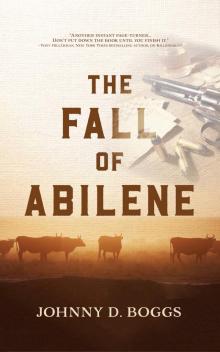 The Fall of Abilene
The Fall of Abilene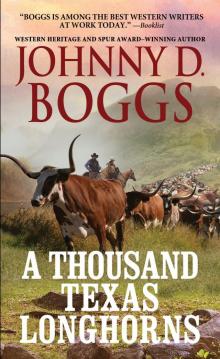 A Thousand Texas Longhorns
A Thousand Texas Longhorns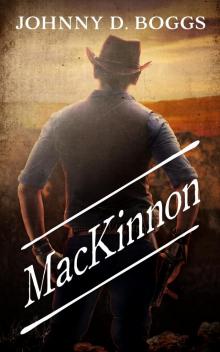 MacKinnon
MacKinnon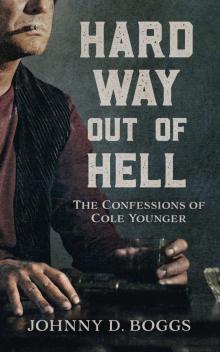 Hard Way Out of Hell
Hard Way Out of Hell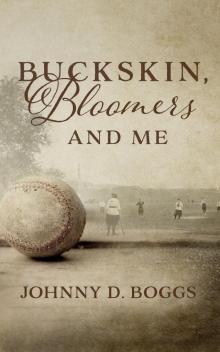 Buckskin, Bloomers, and Me
Buckskin, Bloomers, and Me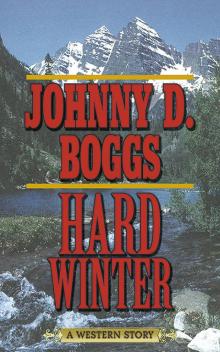 Hard Winter
Hard Winter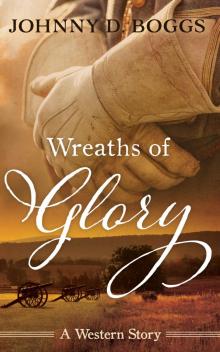 Wreaths of Glory
Wreaths of Glory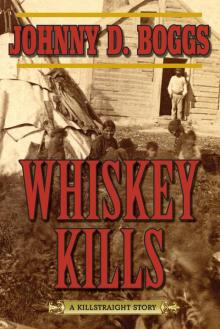 Whiskey Kills
Whiskey Kills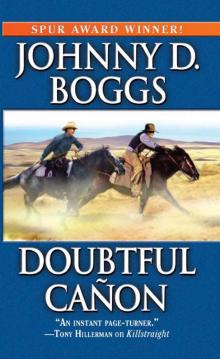 Doubtful Canon
Doubtful Canon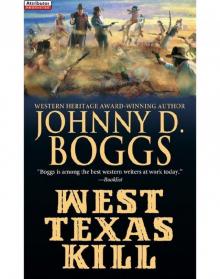 West Texas Kill
West Texas Kill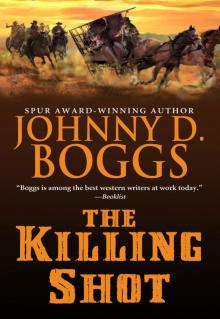 The Killing Shot
The Killing Shot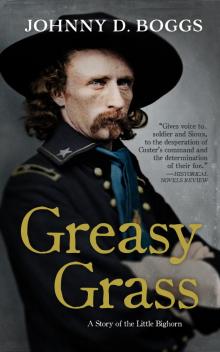 Greasy Grass
Greasy Grass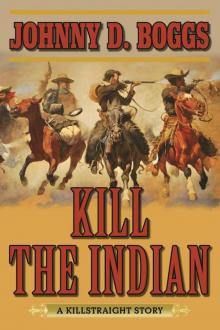 Kill the Indian
Kill the Indian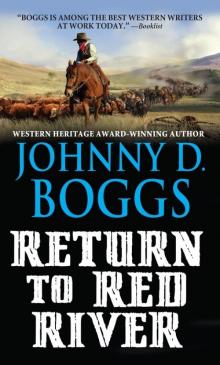 Return to Red River
Return to Red River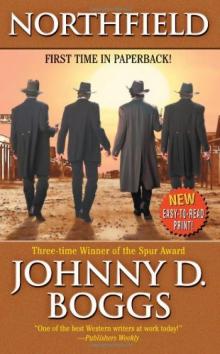 Northfield
Northfield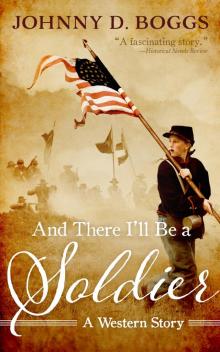 And There I’ll Be a Soldier
And There I’ll Be a Soldier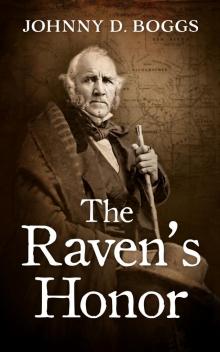 The Raven's Honor
The Raven's Honor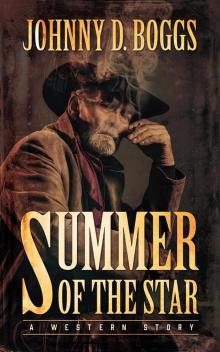 Summer of the Star
Summer of the Star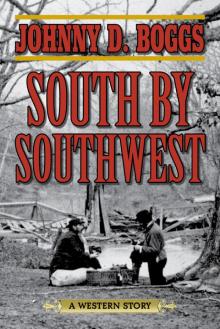 South by Southwest
South by Southwest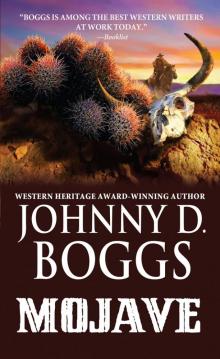 Mojave
Mojave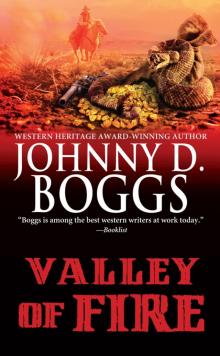 Valley of Fire
Valley of Fire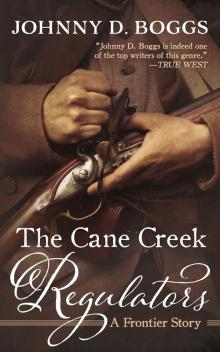 The Cane Creek Regulators
The Cane Creek Regulators